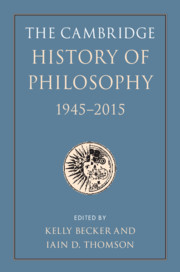Book contents
- The Cambridge History of Philosophy, 1945–2015
- The Cambridge History of Philosophy, 1945–2015
- Copyright page
- Contents
- Contributors
- Preface and Acknowledgments
- Introduction
- Part I Analytic Philosophy
- Section One Language, Mind, Epistemology
- 1 Analytic Philosophy of Language
- 2 Analyticity
- 3 Philosophy of Linguistics
- 4 Varieties of Externalism, Linguistic and Mental
- 5 An Analytic-Hermeneutic History of Consciousness
- 6 Computational Philosophies of Mind
- 7 Philosophy of Action
- 8 Contemporary Responses to Radical Skepticism
- 9 Post-Gettier Epistemology
- Section Two Logic, Metaphysics, Science
- Section Three Analytic Moral, Social, and Political Philosophy
- Section Four Analytic Aesthetics and Philosophy of Religion
- Part II Continental Philosophy
- Part III Bridge Builders, Border Crossers, Synthesizers, and Comparative Philosophy
- Part IV Epilogue: On the Philosophy of the History of Philosophy
- References
- Index
4 - Varieties of Externalism, Linguistic and Mental
from Section One - Language, Mind, Epistemology
Published online by Cambridge University Press: 08 November 2019
- The Cambridge History of Philosophy, 1945–2015
- The Cambridge History of Philosophy, 1945–2015
- Copyright page
- Contents
- Contributors
- Preface and Acknowledgments
- Introduction
- Part I Analytic Philosophy
- Section One Language, Mind, Epistemology
- 1 Analytic Philosophy of Language
- 2 Analyticity
- 3 Philosophy of Linguistics
- 4 Varieties of Externalism, Linguistic and Mental
- 5 An Analytic-Hermeneutic History of Consciousness
- 6 Computational Philosophies of Mind
- 7 Philosophy of Action
- 8 Contemporary Responses to Radical Skepticism
- 9 Post-Gettier Epistemology
- Section Two Logic, Metaphysics, Science
- Section Three Analytic Moral, Social, and Political Philosophy
- Section Four Analytic Aesthetics and Philosophy of Religion
- Part II Continental Philosophy
- Part III Bridge Builders, Border Crossers, Synthesizers, and Comparative Philosophy
- Part IV Epilogue: On the Philosophy of the History of Philosophy
- References
- Index
Summary
In the philosophy of mind and language, “externalism” is a label for a class of doctrines regarding the conditions that determine the intentional, representational properties of words and/or mental states. Originating in the 1960s and 1970s in the “New Theory of Reference” for singular terms, by the late 1970s externalist views spread into the philosophy of mind as well. Accordingly, there are externalist doctrines regarding the factors that determine the reference of an expression (as used on an occasion), the linguistic meaning of an expression (in a given language), and the content of a mental state. This chapter presents a historical overview of the emergence and variety of externalist doctrines, the arguments that have been given for them, and the ways in which they have been resisted.
- Type
- Chapter
- Information
- The Cambridge History of Philosophy, 1945–2015 , pp. 60 - 73Publisher: Cambridge University PressPrint publication year: 2019



